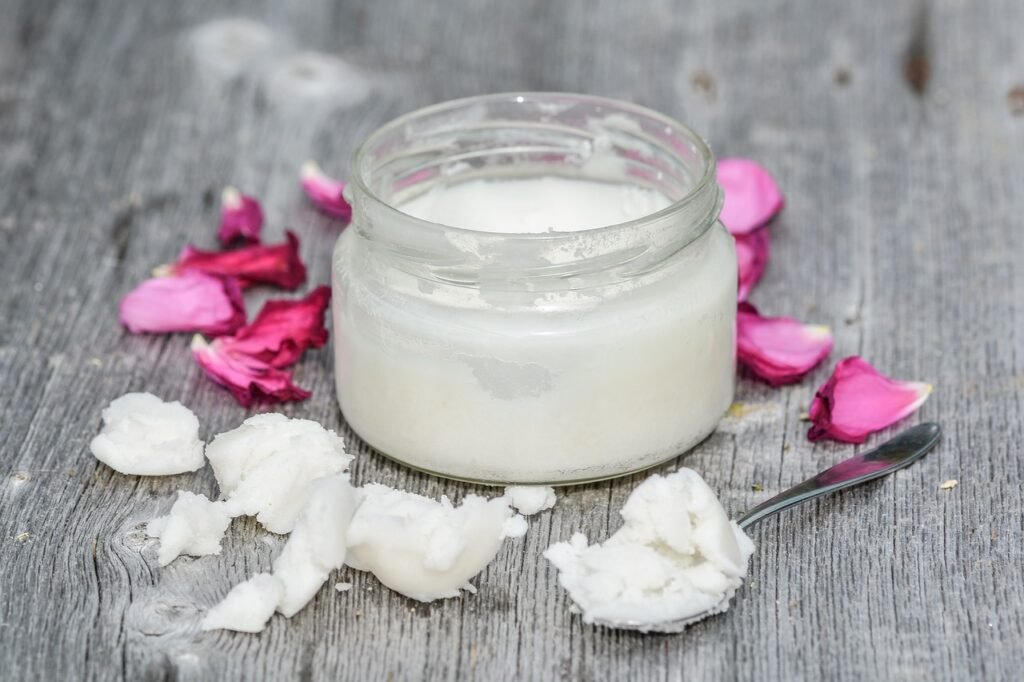Coconut oil is the multi-tasking superstar you didn’t know your life was missing. Extracted from the meat of mature coconuts, this versatile oil has been a staple in tropical regions for centuries, revered for its myriad of health, beauty, and culinary applications. Its rich composition of fatty acids provides deep nourishment and hydration, making it a go-to ingredient in skincare and haircare regimes worldwide.

Beyond beauty, coconut oil boasts antimicrobial properties, aiding in wound healing and oral health when used in oil pulling. In the kitchen, it shines with a high smoke point, enhancing dishes with a subtle, exotic flavor. Whether you’re whipping up a delicious meal, moisturizing dry skin, or seeking natural remedies, coconut oil’s benefits are as plentiful as the sands on a tropical beach. Discover the power of this natural marvel, and elevate your everyday routines to new heights.
Top Benefits of Coconut Oil for Hair health
1. Deep Conditioning: Its fatty acids penetrate hair deeply, providing intense hydration and reducing protein loss.
2. Scalp Health: Antifungal properties help combat dandruff and soothe irritation.
3. Shine and Softness: Adds a natural, healthy glow, making hair silky and manageable.
How coconut oil nourish your skin?
1. Moisturization: Rich in fatty acids, it’s fantastic for locking in moisture and softening dry skin.
2. Anti-Aging: Contains antioxidants, which help fight free radicals and reduce signs of aging.
3. Healing: Antimicrobial properties aid in treating minor cuts, wounds, and skin infections.
Coconut oil for acne: does it really help?
Potential Benefits
1. Antimicrobial Properties: Some studies suggest that coconut oil’s fatty acids can kill certain bacteria that contribute to acne
2. Anti-Inflammatory Effects: It may help reduce inflammation and soothe irritated skin
Potential Drawbacks
1. Pore Clogging: Coconut oil is comedogenic, meaning it can clog pores and potentially worsen acne for those with oily or acne-prone skin
2.Mixed Results: Scientific research on coconut oil’s effectiveness for acne is limited, and results are mixed
Usage Tips
– Patch Test: Always do a patch test before applying coconut oil to your face.
– Moderation: Use it sparingly and avoid applying it to active breakouts.
– Consult a Dermatologist: If you have persistent acne, it’s best to consult a healthcare professional.
Benefits of Coconut Oil for Cooking
1. High Smoke Point: Ideal for frying and sautéing without breaking down into harmful compounds.
2. Flavor Enhancement: Adds a subtle, sweet coconut flavor to dishes.
3. Nutrient-Rich: Packed with medium-chain triglycerides (MCTs), which provide a quick energy boost and support metabolism.
Frequently asked questions (FAQ)
1. What are the benefits of using coconut oil for hair and skin?
Coconut oil provides deep hydration, promotes a healthy scalp, and adds shine to hair. For skin, it’s a fantastic moisturizer, has anti-aging properties, and helps heal minor wounds and infections.
2. Can coconut oil help with weight loss?
Some studies suggest that MCTs in coconut oil may boost metabolism and reduce appetite, potentially aiding weight loss.
3. Is coconut oil good for oral health?
Yes, it’s used in a practice called oil pulling, where swishing it around in your mouth helps reduce harmful bacteria and improves dental health.
4. Can coconut oil be used for cooking and skincare?
Absolutely, it’s highly versatile and safe for both uses. Just make sure you’re using unrefined, organic coconut oil for the best benefits.
5. Can coconut oil be used to treat eczema?
Yes, coconut oil’s moisturizing and anti-inflammatory properties can help soothe eczema symptoms. However, it’s always best to consult with a healthcare professional before using it as a treatment.
6. Is coconut oil suitable for all skin types?
While it’s generally beneficial for dry and normal skin types, those with oily or acne-prone skin should use it sparingly, as it can sometimes clog pores.
7. How does coconut oil compare to other oils for hair care?
Unlike many other oils, coconut oil can penetrate the hair shaft, providing deep conditioning and reducing protein loss. Its unique properties make it particularly effective for dry, damaged, or chemically treated hair.
8. Can I use coconut oil as a natural deodorant?
Yes, coconut oil’s antibacterial properties can help reduce odor-causing bacteria. You can use it alone or mix it with baking soda and essential oils for a DIY deodorant.
9. What are some creative ways to use coconut oil in cooking?
Beyond frying and baking, you can add it to smoothies for a nutrient boost, use it in salad dressings for a tropical twist, or incorporate it into homemade granola or energy bars.
Conclusion
Coconut oil is a true marvel, seamlessly bridging the gap between health, beauty, and culinary arts. For hair, its deep conditioning and shine-enhancing properties make it a go-to treatment, while for skin, it provides unparalleled moisturization, anti-aging benefits, and healing power. In the kitchen, its high smoke point and rich composition of MCTs not only enhance the flavor of dishes but also support a healthy metabolism. Embrace coconut oil’s versatility, and experience its transformative benefits in every aspect of your daily life.
coconut oil stands out as a versatile and indispensable ingredient for both health and beauty. Its deep conditioning and shine-boosting properties make it a hair care essential, while its moisturizing and healing benefits render it invaluable for skincare. In the culinary realm, coconut oil’s high smoke point and rich, nutrient-packed composition make it a staple in healthy cooking. Whether you’re aiming for luscious locks, radiant skin, or delicious dishes, coconut oil’s multifaceted benefits are unmatched. Embrace the power of nature’s liquid gold and elevate your everyday routines effortlessly.
Sources
1. Healthline


